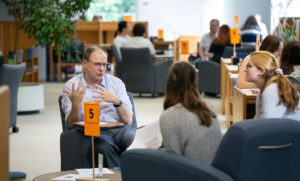
By Grace Lewis || Staff Writer
Picture this—me, a first-year student here at Franklin & Marshall, going to my first days of classes, and seeing on the syllabus “9/26 DAY OF DIALOGUE—NO CLASSES.” A day off on my busiest day of the week sounded like a dream; plus, I had an exam that Friday which would give me extra time to study, or even just to sleep. Me, being just one person out of the approximate 2,300 students at F&M, couldn’t have been the only one who had this thought. A break seemed great, even just a day, as we creep closer and closer towards midterms, which I was already terrified for as is. But then I learned more—I thought: alright a day talking about the issues of our society seems good and a step in the right direction, but I wasn’t totally convinced.
As the day got closer, I had found my interests here and saw the issues that happen on campus, I thought the Day of Dialogue could be a pretty good idea. I mean what is the harm in having conversations about our differences? It may not do much, but it will do something. The schedule came out and the variety of the sessions was impressive. Personally, I wanted to attend the seminars about Guns in America and Hyper-Masculinity, as those are both issues that I am very passionate about and feel have been incredibly prevalent in our society throughout time and especially now. Unfortunately, they were scheduled at the same time. Ultimately, I attended Hyper-Masculinity, which was fascinating considering the events of this week with Kavanaugh’s hearing and Dr. Ford’s testimony.
The Day of Dialogue is centered around having difficult conversations and trying to come to a resolution as a community, despite our differences. The concept of having difficult conversations is avoided greatly. I, myself am not an argumentative person and am afraid of not making my point when arguing, which can deter me from having tough conversations. But this is a common misconception, a difficult conversation is just that, a conversation. There is no need to be argumentative, in fact doing so does not lead to resolution and essentially throws off the whole purpose of the conversation. We like to live in a bubble; we surround ourselves with likeminded people to get away from disagreement. This bubble puts a stigma on the people with whom we do not associate. At times we even go so far as to dehumanize different groups. Disagreement is inevitable and we all fall on different parts of the spectrum regarding our beliefs, but talking about our differences is what is important.
We have seen it in our history and in our present lives that we as a world and a country are divided with all of our different beliefs. I’ve wrote it before, and I will write it again, that our species wants to advance and we want to take care of each other. This action is an evolutionary trait. We are fractured and broken into small little pieces with our different opinions. It’s common to hear that we have to remember that we are one group of people. We all want different things and have different passions, and those differences include opinions. If we are accepting of people’s different passions, shouldn’t we also be accepting of their opinions, rejoicing in our differences that keep us from living in a bland, robotic society. These differences are vital, but when we argue we see these differences break us apart. The Day of Dialogue is a step in the right direction as we begin to have difficult conversations with the purpose of putting the shards of our communities back together. Difficult conversations are hard, and the bubbles we like to live in are easy; but the difficult conversations lead to the truth.
First-year Grace Lewis is a Staff Writer. Her email is glewis@fandm.edu.